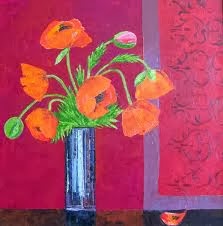 |
| Image from russell-gallery.com |
Vase Poppies
BY JENNIFER SCAPPETTONE
Lavenderish dusk
strapped for stays,
pomegranates under the rubberband
chucked for a glass Oz,
letdown
splayed by the pillar-shelves
to page upon the Ottoman:
his talk has wrought suit
amid citrus gapes
and pall dunked in the bowl
and grated sage
or cleaved clear paleo-pines.
Postgeist, upcast
California upon weed,
what banker yields
so fragrant a cant
as this vagrant cant?
Information from PoetryFoundation.org: Jennifer Scappettone, “Vase Poppies” from an unpublished manuscript. Copyright © 2010 by Jennifer Scappettone. Reprinted by permission of Jennifer Scappettone.
Source: Unpublished (2010)
----------------------------------------
I found it interesting that Scappettone had to explain that, depending on your class, you pronounce vase differently. I thought that it hinted at the differences between the natural and outdoor quality of H.D.'s "Sea Poppies" and the artificial and indoor quality of "Vase Poppies." And I also caught a tone of disdain for the pretentious "other" pronunciation which she did not use in her reading.
Everything about "Sea Poppies" talks about the virtues of being hardy and out in the harsh conditions of nature. Whereas "Vase Poppies" talks about everything artificial and contrived and urbane. I really did catch the whiff of subject mockery in Scappettone's poem (whereas in H.D.'s poem, it is all praise for the subject).
I was a bit confused. Was Scappettone a) paying an homage to H.D., b) ironizing H.D., c) outright mocking the imagist process?
I appreciated the attempt to find out in the video discussion, although, it seemed to me that even the discussion did not come to a conclusion on this. However, what I did get was that "you can't say it that way anymore." There is always a call to "make it new" in language which Scappettone attempted in her poem.
If I were to follow the pattern in ModPo, it would be to focus on the form and not just on the content. Did Scappettone deliver the message in the medium? She successfully used H.D.'s very form and turned her own poem into the exact opposite of H.D.'s. What is she ultimately saying? I believe it is: All is artifice. Better get used to it, baby.

